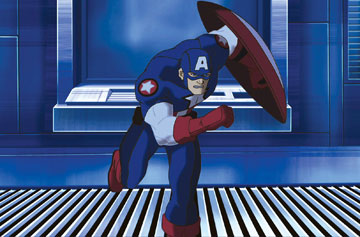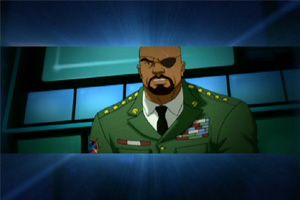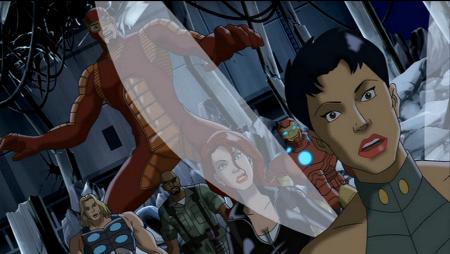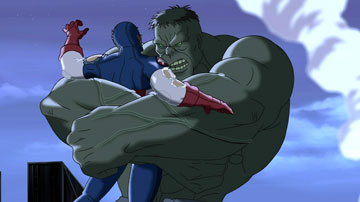
Best to begin this with what Ultimate Avengers is not. It’s not the movie I’d hoped it would be. What is these days, right? It’s not a shot-by-shot recreation of the similarly named, and much more thematically complicated Mark Millar/Bryan Hitch comic book miniseries upon which it is based. It’s not necessarily a major milestone in American animation. (No Fritz the Cat’s here, folks, keep walking.) It is not Marvel’s answer to Paul Dini’s spectacular Justice League series, which did more with more characters, smaller budgets, and the Ever Present Eye of Cartoon Network’s Standards and Practices.
Ultimate Avengers is not a great movie at all…and it shakes and shutters on the cusp of being good. By any objective or technical measure it’s not really that, either. The reasons why become quickly apparent. But first: plot synopsis.
Ultimate Avengers opens (like so much else in the Marvel Universe) during the winningest days of World War II. Hitler is dead, his armies in retreat, Germany safely carpet-bombed back to the Middle Ages. “But what,” asks the radio announcer, “are these rumors of a secret Nazi super weapon aimed at Washington? Categorically false, says the War [nee, Defense] Department. And we believe them!”
Lies, damn lies. How little things change. A rag-tag band of Nazi troopers, directed by the sinister Herr Kleiser (Jim Ward), is indeed working desperately on a Nazi super weapon. Thankfully, the forces of democracy have deployed their own super weapon, along with a squad of paratroopers, to the Nazi’s North Atlantic island stronghold. Enter Steve Rogers, Captain America (Justin Gross).
A word about him from a nerd in the know. Steve was declared 4-F after he volunteered in 1942: too skinny, too frail, even for a US army strapped for warm bodies and gearing up to fight a two-front war. But Liberty need not have feared, for months of super secret government experimentation transformed Steve into the world’s first Super Soldier. Utilizing a secret Nazi formula (and the defecting Nazi scientist who created it), the War Department tricked out Steve’s speed, strength, senses and kinesthetic abilities like an MTV crew pimping out a rap star’s ride, transforming him into the most jingoistic superhero known to man.

(And you thought the US government only experimented on black Alabamans.) Armed only with a shield (and a few grenades, sidearms, whatever) young Steve became a special forces unit unto himself, leading the charge against (other nation’s) fascism for truth (as defined by the War Department) justice (as defined by the chaos of war) and the all-important America Way (as defined by no one). For these and many other reasons, Cap has always been a fan favorite. He is, to an extent, the Marvel Universe’s Batman analog. Both are penacles of human physical perfection, so much so that (as my friend Thomas used to say) they “would sure as hell seem to have superpowers to any of us normal humans.” And the Captain does it all without Bruce’s broody, introspective psychosis. None of that obsessive-compulsive drive to fulfill “the Mission” for Steve. His is a life of constant sub-missions, sometimes dictated by his conscience, sometimes dictated by his State.
Such is the case with the mission that opens Ultimate Avengers. After a bit of Saving Private Ryan daring do, Captain America leads his soldiers into the Nazi stronghold and discovers…aliens. Big, green, drooely motherfuckers who’ve shared explicit How To instructions for building a hydrogen bomb with their Nazi friends. As the sinister Herr Kleiser says, “Patriotic fool, look around you; this is not about Hitler!”
But Captain America knows a Bad Thing when he sees one. Thanks to more daring-do, Cap scuttles the V-1 rocket and its deadly payload over the icy depths of the North Atlantic, just as it takes off. The blast tosses his body far out to sea where he sinks like a flag-clad stone…awaiting the end of the credit sequence.
It’s always like this with the Captain. Even that atrocious Albert Pyun adaptation began with a similar opening. No aliens, but there was the H-bomb. There was Steve. There’s Steve’s Nazi analog, the Third Reich’s own super soldier, ready for the Final Battle. And there’s Steve’s body, drifting down into the frozen depths.
Captain America presents several narrative challenges for anyone with the balls to re-tell his story. Unlike his superheroic contemporaries, Cap is and ever shall be a product of his time. No way anyone would even think of ret-conning him into the 1960s, setting his origin in the mine-ridden mire of Vietnam. (Except for me, apparently.) Part of his appeal lies in the “innocence” that we modern Americans (foolishly) believe our past contemporaries possessed. Steve goes to his icy tomb believing in platitudes like Truth and Justice in a way that we cynical children of the 21st century either can’t or flat out won’t accept. Yet, we and the Captain can make it happen, we can believe in that Goodness again, even if only for the time it takes to read a twenty two page comic book. Cap is the essential American narrative, the White Hat vs. Black Hat story we so love to tell ourselves. He is the very model of a “[p]atriotic fool” and we (I say we, even though I really can’t include myself in this statement) love him for it. That’s why he’s still around, and why writers of various media have to keep inventing even more outlandish ways to bring him forward in time, where someone—usually a salad-chest with a briefing folder under their arm—always stands ready to remind Steve that, “You still have your country, and we need you now more than ever.”
(My fantasy? Steve’s immediate response to such a sentiment involves a super soldier punch to the face and a tersely grunted, “Fuck you, sir.” After all, here’s a man who’s lost everything and everyone he’s ever loved or care about, who has literally sacrificed it all for his supposedly grateful country, who’s world has been destroyed as thoroughly as Kal-El’s Krypton, J’onn’s Mars or Shyara Hol’s Thanagar. And what does his supposedly grateful country offer him? More of the same.)
Fast forward sixty years. The government agency known as the Supreme Headquarters International Espionage Law-Enforcement Division (that’s SHEILD to you) discovers Steve’s frozen remains and sets about retrieving them. Led by an inexplicably-black General Nick Fury (Andre Ware), the expedition is a late-stage breakthrough in SHELD’s efforts to revive the Super Soldier Project. Operating out of SHEILD’s massive headquarters in the middle of New York Harbor, the SSP has met with little-or-no success so far. General Fury hopes their Cap-cicle will change all that, as do the head project scientists, Drs. Betty Ross (Nan McNamara) and Robert Bruce Banner (Michael Massee).
The problems of reviving a survivor of suspended animation are completely glossed over, as expected. Cap literally jumps off the examination table, taking SHEILD’s scientific and security team to well-choreographed task in the process. A quick gaze at the New York City skyline reveals that Steve is no longer in proverbial Kansas. “Did we win?” he asks General Fury, as a SHEILD heli-carrier lands before them. “Yeah, son,” the general says. “We did.” Its fucked us up as a nation ever since, but before good Ol’ Nick can get to that Captain America faints like a little bitch.

Now the real plot can begin, sparse though it may be. It turns out the alien Nazi collaborators are still with us today. They’re the ones responsible for the last sixty years worth of UFO sightings. SHEILD’s finally figured out a way to track them thanks to the unusual metal in their hulls. The aliens, which the Germans, and thus SHEILD, call “Chitari,” don’t take kindly to this, and push satellites out of orbit (and the NASA shuttles that bring them up) to demonstrate their displeasure.
With Project Super Soldier delayed indefinitely and the Chitari always one step ahead of we mere mortals, General Fury’s holographic superiors order him to, “jump start Project Avenger,” our Government’s last, best hope for a team of super powered human weapons. “You have our short list,” the Big Giant Heads say before signing off. Apart from the Captain, which we know, said list, includes:
-Natalia Romanoff (Olivia d’Abo), the Black Widow: ex-KGB, ex-CIA, now permanent fixer for SHEILD and General Fury’s personal “Number One.” A Russian spy with more guns than your mother has shoes.
-Dr. Henry Pym (Nolan North), physicist, size-changing superhero. Like his contemporary, Dr. Ray Palmer of Boston, Dr. Pym hit upon a way to shrink himself to near-microscopic size. Calling himself Ant Man, Dr. Pym had many adventures throughout the years, defeating a succession of second-string villains. Once a comfortable, Reed Richards analog, Dr. Pym has since been re-imagined as a backbiting hothead, overly-driven and occasionally abusive, much to the chagrin of his wife
-Dr. Janet Pym (Grey DeLisle), a.k.a., the Wasp. She, too, jumped on the shrinking bandwagon, even designing herself some fire-shooting gauntlets and insubstantial pixy wings. With her help (not that he would admit it) her “pretentious lab jockey” husband has even found a way to reverse his own shrinking process, becoming…every abusive husband’s fantasy, Giant Man. The rough edges of their relationship (sharp as tacks in the comic book series) are smoothed down to PG-13 levels, but anyone even casually familiar with their relationship dynamics should instantly recognize the pregnant violence in their interactions…especially since I’ve just spoiled it for you.
Moving on, we find the hard-drinking, arms-dealing playboy billionaire Tony Stark (Marc Worden), who quiets his social conscience with a custom-made suit of armor and the occasional heroic deed. Thus enters Iron Man, my old childhood favorite. Retrospect allows me to recognize a perverse fascination with characters (again, like Tony’s DC analog, Bruce Wayne) who are never more themselves than when they’re dressed up in funny clothes.
But don’t let his income bracket fool you: Tony is miles away from our good Mr. Wayne. Both may be giant children obsessed with their special play suits, but Tony began his superheroing for entirely selfish reasons…his own survival, ‘natch. But that’s another story. One this movie does not deem to tell, so any consideration of it will have to wait for another time.
Let us then consider Thor (David Boat), then, son of Odin, Storm God of War to the ancient Norsemen who savaged the “civilized” centers of medieval Europe. They wore wolf hair and made drum heads out of the skin of their screaming victims. But let’s not think about that. This is the 21st century and the Son of Odin is supposed to be a Good Guy…right? Right. Thankfully, the producers of this film actually bother to ask what a god (any ancient god) would make off the 21st century’s total abuse of nature. Never mind what I would do with Thor’s brand of godly might. Here, Thor is recast as the Ultimate Environmentalist, so much so that Cap and Fury confront him of the deck of his own boat after he’s successfully turned back a whaling ship by calling up a storm.
Still a Viking at heart, Thor’s initially uninterested in joining the team. “But at least,” he says, embracing Steve, “your team will have a conscience.” And when the world is threatened by alien invasion you know the son of Odin won’t be all that far behind. Will the good Captain grow into his role as both paragon and field leader of this rag-tag band? Will that band, which General Fury describes as “super powered showboaters,” even follow his lead? What exactly are the Chitari planning now that they know we know how to track their movements through our atmosphere? And what exactly is Bruce Banner toiling on, deep in the bowls of SHEILD headquarters? You and I both know giving Dr. Banner unfettered access to a lab ranks fairly fucking high in the universe of all possible Bad Ideas. Situations like that just never seem to end well for some big, angry, emerald-colored reason…Betty Ross can keep the poor bastard in check for only so long.

Considerations: Cap, Bruce and Betty are the emotional heart of the piece. But thanks to the sheer volume of characters, not to mention the main plot, with its attendant action sequences, their stories have to sacrifice a whole lot of space. Ultimate Avengers screenwriter Greg Johnson chooses to handle this through the use of our old friend, the Clunky Expository Statement. Ask for it by name, and cringe as the voice actors strain to somehow make these things sound like the natural utterances of normal human beings. (Superpowered, possibly insane human beings, but still…)
At least the Drs. Pym can shout these things at each other during arguments…though they only do this once. Still, that argument is a wonderful exchange, seemingly ripped from the heart of any real-life co-dependent relationship. Henry’s possessive, obsessive love for Janet remains implicit throughout, as does her loyalty to him, and her continued belief in whatever inherent goodness might reside under that big red-orange suit of his. This becomes somewhat more believable thanks to the excising of GiAnt Man’s more abusive tendencies…but not nearly as dramatic. Drama, here, is sacrificed for time and rating considerations. American animation producers are still wary of treading into the land of PG.
Tony Stark’s alcoholism, also implied but never addressed, becomes another sacrificial element. Hell, Tony gets the shortest shift of anyone. At least Natalia gets to share a moment with old Steve. Mr. Stark is utterly aloof, removed from the proceedings…except when he’s in that suit of his. I’m not asking for him to be likeable, gosh no (the Fox Kids cartoon of my childhood went that route…with mixed results), but he could at least be a character unto himself. More than “that guy with the flames coming out of his boots.”
At the very least, I’m thankful Ultimate Avengers avoided the massive post-production re-editing that so blunted Batman Beyond: Return of the Joker. Helps if you don’t release your movie after a major terrorist attack. Ironically, a few clips here and there (mostly during the massive, full-court press that is this movie’s climactic action sequence) might have freed up a bit more room for character development, making the film as a whole more accessible to the Great Unwashed, who know Cap, Thor, Iron Man and all the rest only in passing, if at all.
This is not their movie by any stretch. It serves them only as a cursory introduction to the Marvel universe. We the fans have the luxury of oo-ing and ah-ing ourselves into superhero apoplexy (especially during the aforementioned climactic action sequence)…everyone else will be wondering just who the hell that chick with the goddamn pixie wings is and why is she married to that super-sized asshole, anyway?
The alternative? Make the movie longer. Beef it up to a full ninety minutes and give Bruce and Betty some more face time. It might actually make Dr. Banner a bit more than a nebbish with anger management issues. It might make Betty a little more than his Lady in Waiting. It would certainly help Cap become a bit more accustomed to twenty-first century life. There’s a scene, midway through, where he walks down a suburban street, gawking like all hell at the changes time has wrought. It’s a good scene, and criminally short. As are his reconciliations with Bucky (“I hear they call you ‘Buck’, now.”) and his…ahem…old sweetheart, Gail.
In any out-and-out good movie, these scenes would be high dramatic watermarks, every frame stretched and bent from maximum dramatic effect. Currently they play like tacked-on after thoughts…footnotes in a textbook of superheroic carnage.
Which is not a bad thing in and of itself. This is exceptionally animated superheroic carnage, brilliantly fluid, avoiding any feux-anime (or fanimie) silliness and well directed by all involved, whether they be gaijin in LA, or sweatshop lash masters in Seoul. Mr. Johnson’s writing is sparse but suitably adult apart from the above Expository Statements. And the already touched upon climactic action sequence is one hell of a thing to see.
After all, whenever you get so many powerful individuals on the same side of Good it’s always a bitch and a half to provide them with a suitably powerful Evil. Bless the heart of he (or she) who thought to include Bruce Banner in all of this. Nebbish, nerd, looser, or savior, his presence always lends a film a certain shade of green.
So go out and buy it already, because this movie is by all rights the first entry in an ongoing series that will, hopefully, knock our socks off by the time it reaches its inevitably mindblowing conclusion. Unfortunately it will only be that once we convince the corporate shells who financed this sucker that we really, really, really want it to become that.
![]()
![]()
![]()
